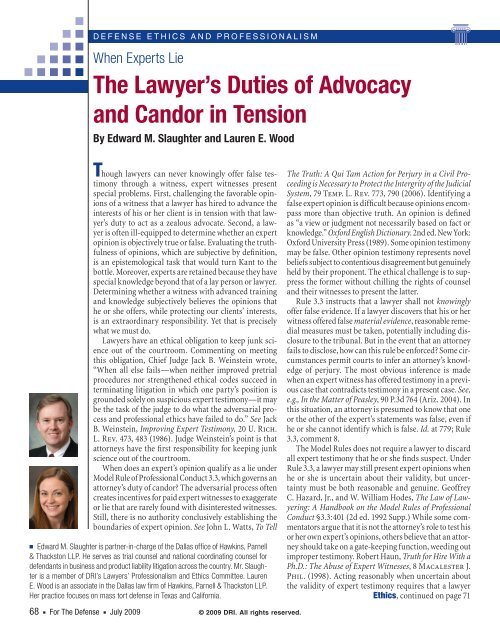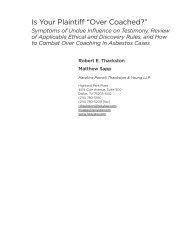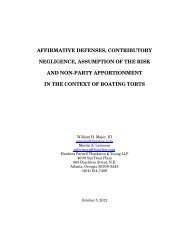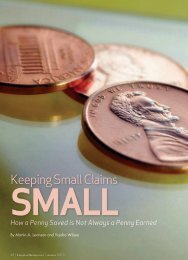The Lawyer's Duties of Advocacy and Candor in Tension - Hawkins ...
The Lawyer's Duties of Advocacy and Candor in Tension - Hawkins ...
The Lawyer's Duties of Advocacy and Candor in Tension - Hawkins ...
You also want an ePaper? Increase the reach of your titles
YUMPU automatically turns print PDFs into web optimized ePapers that Google loves.
Defense Ethics <strong>and</strong> Pr<strong>of</strong>essionalismWhen Experts Lie<strong>The</strong> Lawyer’s <strong>Duties</strong> <strong>of</strong> <strong>Advocacy</strong><strong>and</strong> C<strong>and</strong>or <strong>in</strong> <strong>Tension</strong>By Edward M. Slaughter <strong>and</strong> Lauren E. WoodThough lawyers can never know<strong>in</strong>gly <strong>of</strong>fer false testimonythrough a witness, expert witnesses presentspecial problems. First, challeng<strong>in</strong>g the favorable op<strong>in</strong>ions<strong>of</strong> a witness that a lawyer has hired to advance the<strong>in</strong>terests <strong>of</strong> his or her client is <strong>in</strong> tension with that lawyer’sduty to act as a zealous advocate. Second, a lawyeris <strong>of</strong>ten ill-equipped to determ<strong>in</strong>e whether an expertop<strong>in</strong>ion is objectively true or false. Evaluat<strong>in</strong>g the truthfulness<strong>of</strong> op<strong>in</strong>ions, which are subjective by def<strong>in</strong>ition,is an epistemological task that would turn Kant to thebottle. Moreover, experts are reta<strong>in</strong>ed because they havespecial knowledge beyond that <strong>of</strong> a lay person or lawyer.Determ<strong>in</strong><strong>in</strong>g whether a witness with advanced tra<strong>in</strong><strong>in</strong>g<strong>and</strong> knowledge subjectively believes the op<strong>in</strong>ions thathe or she <strong>of</strong>fers, while protect<strong>in</strong>g our clients’ <strong>in</strong>terests,is an extraord<strong>in</strong>ary responsibility. Yet that is preciselywhat we must do.Lawyers have an ethical obligation to keep junk scienceout <strong>of</strong> the courtroom. Comment<strong>in</strong>g on meet<strong>in</strong>gthis obligation, Chief Judge Jack B. We<strong>in</strong>ste<strong>in</strong> wrote,“When all else fails—when neither improved pretrialprocedures nor strengthened ethical codes succeed <strong>in</strong>term<strong>in</strong>at<strong>in</strong>g litigation <strong>in</strong> which one party’s position isgrounded solely on suspicious expert testimony—it maybe the task <strong>of</strong> the judge to do what the adversarial process<strong>and</strong> pr<strong>of</strong>essional ethics have failed to do.” See JackB. We<strong>in</strong>ste<strong>in</strong>, Improv<strong>in</strong>g Expert Testimony, 20 U. Rich.L. Rev. 473, 483 (1986). Judge We<strong>in</strong>ste<strong>in</strong>’s po<strong>in</strong>t is thatattorneys have the first responsibility for keep<strong>in</strong>g junkscience out <strong>of</strong> the courtroom.When does an expert’s op<strong>in</strong>ion qualify as a lie underModel Rule <strong>of</strong> Pr<strong>of</strong>essional Conduct 3.3, which governs anattorney’s duty <strong>of</strong> c<strong>and</strong>or? <strong>The</strong> adversarial process <strong>of</strong>tencreates <strong>in</strong>centives for paid expert witnesses to exaggerateor lie that are rarely found with dis<strong>in</strong>terested witnesses.Still, there is no authority conclusively establish<strong>in</strong>g theboundaries <strong>of</strong> expert op<strong>in</strong>ion. See John L. Watts, To Tell<strong>The</strong> Truth: A Qui Tam Action for Perjury <strong>in</strong> a Civil Proceed<strong>in</strong>gis Necessary to Protect the Intergrity <strong>of</strong> the JudicialSystem, 79 Temp. L. Rev. 773, 790 (2006). Identify<strong>in</strong>g afalse expert op<strong>in</strong>ion is difficult because op<strong>in</strong>ions encompassmore than objective truth. An op<strong>in</strong>ion is def<strong>in</strong>edas “a view or judgment not necessarily based on fact orknowledge.” Oxford English Dictionary. 2nd ed. New York:Oxford University Press (1989). Some op<strong>in</strong>ion testimonymay be false. Other op<strong>in</strong>ion testimony represents novelbeliefs subject to contentious disagreement but genu<strong>in</strong>elyheld by their proponent. <strong>The</strong> ethical challenge is to suppressthe former without chill<strong>in</strong>g the rights <strong>of</strong> counsel<strong>and</strong> their witnesses to present the latter.Rule 3.3 <strong>in</strong>structs that a lawyer shall not know<strong>in</strong>gly<strong>of</strong>fer false evidence. If a lawyer discovers that his or herwitness <strong>of</strong>fered false material evidence, reasonable remedialmeasures must be taken, potentially <strong>in</strong>clud<strong>in</strong>g disclosureto the tribunal. But <strong>in</strong> the event that an attorneyfails to disclose, how can this rule be enforced? Some circumstancespermit courts to <strong>in</strong>fer an attorney’s knowledge<strong>of</strong> perjury. <strong>The</strong> most obvious <strong>in</strong>ference is madewhen an expert witness has <strong>of</strong>fered testimony <strong>in</strong> a previouscase that contradicts testimony <strong>in</strong> a present case. See,e.g., In the Matter <strong>of</strong> Peasley, 90 P.3d 764 (Ariz. 2004). Inthis situation, an attorney is presumed to know that oneor the other <strong>of</strong> the expert’s statements was false, even ifhe or she cannot identify which is false. Id. at 779; Rule3.3, comment 8.<strong>The</strong> Model Rules does not require a lawyer to discardall expert testimony that he or she f<strong>in</strong>ds suspect. UnderRule 3.3, a lawyer may still present expert op<strong>in</strong>ions whenhe or she is uncerta<strong>in</strong> about their validity, but uncerta<strong>in</strong>tymust be both reasonable <strong>and</strong> genu<strong>in</strong>e. Ge<strong>of</strong>freyC. Hazard, Jr., <strong>and</strong> W. William Hodes, <strong>The</strong> Law <strong>of</strong> Lawyer<strong>in</strong>g:A H<strong>and</strong>book on the Model Rules <strong>of</strong> Pr<strong>of</strong>essionalConduct §3.3:401 (2d ed. 1992 Supp.) While some commentatorsargue that it is not the attorney’s role to test hisor her own expert’s op<strong>in</strong>ions, others believe that an attorneyshould take on a gate-keep<strong>in</strong>g function, weed<strong>in</strong>g outimproper testimony. Robert Haun, Truth for Hire With aPh.D.: <strong>The</strong> Abuse <strong>of</strong> Expert Witnesses, 8 Macalester J.Phil. (1998). Act<strong>in</strong>g reasonably when uncerta<strong>in</strong> aboutn Edward M. Slaughter is partner-<strong>in</strong>-charge <strong>of</strong> the Dallas <strong>of</strong>fice <strong>of</strong> Hawk<strong>in</strong>s, Parnell& Thackston LLP. He serves as trial counsel <strong>and</strong> national coord<strong>in</strong>at<strong>in</strong>g counsel fordefendants <strong>in</strong> bus<strong>in</strong>ess <strong>and</strong> product liability litigation across the country. Mr. Slaughteris a member <strong>of</strong> DRI’s Lawyers’ Pr<strong>of</strong>essionalism <strong>and</strong> Ethics Committee. LaurenE. Wood is an associate <strong>in</strong> the Dallas law firm <strong>of</strong> Hawk<strong>in</strong>s, Parnell & Thackston LLP. the validity <strong>of</strong> expert testimony requires that a lawyerHer practice focuses on mass tort defense <strong>in</strong> Texas <strong>and</strong> California. Ethics, cont<strong>in</strong>ued on page 7168 n For <strong>The</strong> Defense n July 2009© 2009 DRI. All rights reserved.
Ethics, from page 68seriously evaluate the expert <strong>and</strong> his or herop<strong>in</strong>ions before <strong>of</strong>fer<strong>in</strong>g them.Former U.S. Attorney General DickThornburgh, comment<strong>in</strong>g on our ethicalobligations, said, “[i]t is unethical lawyerswho are largely to blame for junk science.”Dick Thornburgh, Junk Science—<strong>The</strong> Lawyer’sEthical Responsibilities, 25 FordhamUrb. L.J. 449 <strong>and</strong> 462 (1998). He suggestedthat lawyers have an ethical obligation totest the op<strong>in</strong>ions <strong>of</strong> their own experts <strong>and</strong><strong>of</strong>fer only those that are supportable. Heconcluded that attorneys who present junkscience testimony <strong>in</strong> bad faith should faceRule 11 sanctions. Id. at 467. <strong>The</strong>re is a dist<strong>in</strong>ctionbetween op<strong>in</strong>ions that cannot besupported to the satisfaction <strong>of</strong> a court <strong>and</strong>outright lies <strong>of</strong>fered by paid witnesses. Asstewards <strong>of</strong> the law <strong>and</strong> our pr<strong>of</strong>ession, weshould endeavor to keep both out <strong>of</strong> thecourtroom, <strong>in</strong> keep<strong>in</strong>g with our duty <strong>of</strong>c<strong>and</strong>or to the court.For <strong>The</strong> Defense n July 2009 n 71






